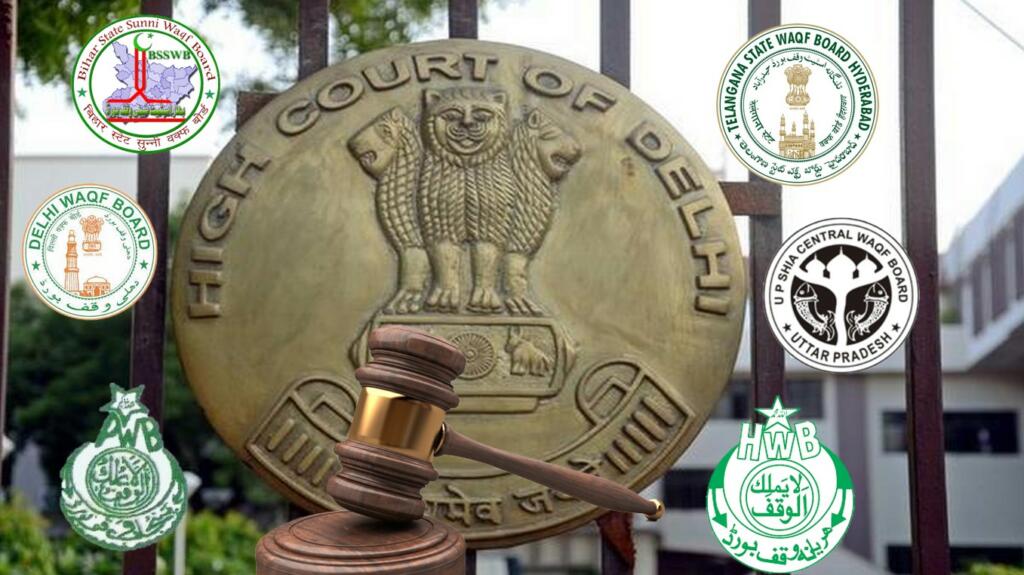Those who are not aware of how Waqf Boards act, tend to perceive them as some kind of revered institution. But, the fact of the matter is that there are looming questions about even the legality of these institutions. Soon, the Judiciary is expected to answer the question surrounding it.
Delhi High Court on the legality of the Waqf Act
Delhi High Court has issued notice to the respondents in a case challenging the Constitutional validity of the Waqf Act, 1995. It was issued by a bench of acting Chief Justice Vipin Sanghi and Justice Naveen Chawla. One of the recipients of this notice is the Union government which was included because one of the issues involved is a violation of the Constitution.
On 18th April 2022, a Public Interest Litigation (PIL) was filed in Delhi High Court by renowned Advocate and BJP leader Ashwini Kumar Upadhyay. In his plea, Upadhyay argued that designating a specially designed act for a particular community defeats the fundamental tenet of Secularism enshrined in the Indian Constitution. Upadhyay informed the Court that there is no such act for any other religious community in the country.
Waqf Board is against Constitutional provision
According to the petition, the Waqf Act, 1995 does not stand the test of minority protection provided under the Constitution of India. “if the impugned Act has been made to protect the rights guaranteed under Articles 29-30 then it has to cover all the minorities i.e., followers of Jainism, Buddhism, Sikhism, Judaism, Bahaism, Zoroastrianism, Christianity, and not only Islam” says the plea
Ashwini’s plea especially emphasises the non-consonance between the Waqf Act and Article 14-15 of the Indian Constitution. Article 14-15 prohibits the government of the day from discriminating against someone for their religion, race, caste, sex, place of birth or any of them. In his plea, Upadhyay said that the Religious Endowment Act 1863, Indian Trustees Act 1866, Indian Trust Act 1882, Charitable Endowment Act 1890, Official Trustees Act 1913 and Charitable and Religious Act 1990 guide trusteeship and religious endowment of all communities.
“But rather than unifying them and making a ‘Uniform Code for Trust and Trustees, Charities and Charitable Institutions, Charitable and Religious Endowments and Religious Institution’, Centre has arbitrarily enacted the impugned religion-biased Act against the basic tenets of Articles 14-15.” plea further explained
Read more: No more legal immunity for the Waqf Board!
Non-Muslims are helpless
One of the major bones of contention raised by Ashwini Kumar Upadhyay is that people of other religions like Hindus, Jains, Buddhists, Sikhs and other communities have zero protection available in case the Waqf Board goes haywire. So, basically, if any person’s property is declared to be Waqf property by the Waqf board, then he will have to hand it to the board.
Currently, the only recourse against an unjustified claim by Waqf Board is available under Waqf Tribunal. Upadhyay’s plea seeks to change that. He has asked the Judiciary to make the Waqf Tribunal non-mandatory. As an alternative, Ashwini suggests that these cases should be tried only under Section 9 of the Civil Procedure Code 1908.
It is to be noted that the first law on Waqf Act was made in 1923, in which no privilege was given to the Board. The purpose of making this act was that if a Muslim wants to give his property to Allah, then he can give it to Allah and his property will be looked after by the Waqf Board. After that, some amendments were made to it from time to time. The first amendment was done under the Waqf Act 1954, in which it was given few powers.
Land grabbing legalised in the garb of religion
At the time of the Waqf Act 1984, Rajiv Gandhi gave it more privileges, but in 1995, when the new Waqf Act 1995 was brought, it was also given administrative and judicial rights. And then in the year 2013, Manmohan Singh made some amendments to it and the Waqf Board reached the peak of its power.
- Sec 28 & sec 29 compel the State Machinery and the DM to follow the orders of the Waqf Board. Basically, the Waqf board acts as a state inside the state
- Under Section 36 & Section 40 of the Waqf Act, 1995, Waqf Board can declare any property, whether private, society or any trust, as its property.
- Section 40(1) states that if the property of an individual is declared as Waqf property, then that individual does not even have a right to get a copy of that order, Moreover, if he does not appeal against him within 3 years, then that order will be final.
- Section 85 and 89 make it mandatory for a victim to ask Waqf Tribunal for remedy. If an individual wants to file a case in Civil Court, then Waqf Board has to be informed 2 months before the filing of a formal appeal.
- Section 101 declares Waqf Board members as public servants. There is no such privilege accorded to people working for any other religious institution.
Waqf’s power needs to be curtailed
Waqf is a completely religious institution which is acting as a land mafia under the guise of religion. According to a 2006 report by Sachar Committee, in India, there were nearly 5 lakh registered Waqfs with 6lakh acres of land. The total book value of the land at the time of the report was Rs 6,000 crores. The numbers are only expected to rise in the last one and a half-decade or so, especially after the 2013 change in Waqf Act by the Manmohan government.
Congress not only gave Waqf Board legal validity under the Waqf Act of 1995 but also gave it constitutional recognition. Ashwini Kumar Upadhyay’s petition just seeks to outstrip the Waqf Board from Constitutional protection.
